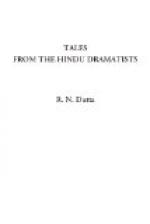In the seventh act we have a remarkable stanza, in which the conduct of Chandanadasa, in sacrificing his life for his friend Rakshasa, is stated to have transcended the nobility even of the Buddhas. It seems that this allusion to Buddhism belongs to a period long prior to the decay and ultimate disappearance of Buddhism from India. In the time of Hionen-Tsang—i.e. between 629-645 A.D.—it was, however, still far from being decayed, though it appears to have fallen very far below the point at which it stood in Fa-Hian’s time, to have been equal in power with Brahminism only where it was supported by powerful kings, and to have been generally accepted as the prevailing religion of the country only in Kashmir and the Upper Punjab, in Magadha and in Guzerat. In this condition of things, it was still quite possible, that one not himself a Buddhist—and Visakhadatta plainly was not one—should refer to Buddhism in the complimentary terms we find in the passage under discussion.
The late Mr. Justice Telang observes:—“The policy of Chanakya is not remarkable for high morality. From the most ordinary deception and personation, up to forgery and murder, every device is resorted to that could be of service in the achievement of the end which Chanakya had determined for himself. There is no lack of highly objectionable and immoral proceedings. It must be admitted that this indicates a very low state of public morality, and the formal works on politics which exist certainly do not disclose anything better. With reference to the criticisms which have been based on these facts, however, there are one or two circumstances to be taken into account. In the first place, although this is no excuse, it may be said to be an extenuation, that the questionable proceedings referred to are all taken in furtherance of what is, in itself, a very proper end. Chanakya’s ambition is to make his protege, Chandragupta firm upon his throne, and to bring back Rakshasa to the service of the king who properly represented those old masters of his to whom Rakshasa’s loyalty still remained quite firm. If the end could ever be regarded as justifying the means, it might be so regarded in this case. And, secondly, it must not be forgotten, that the games of diplomacy and politics have always been games of more or less doubtful morality. When we hear of one great politician of modern days declaring another to be a great statesman, because, as I believe he expressed it, the latter lied so cleverly, we cannot say that the world has risen to any very perceptibly higher moral plane in the times of Metternich and Napoleon, than in those of Chanakya and Rakshasa. Nor are suppressions of important passages in despatches for the purposes of publication, or wars undertaken on unjustifiable and really selfish pretexts, calculated to convince one, that even in Europe in the nineteenth century, the transaction of political affairs has been purged of the taint of immorality, however different, and I may even add, comparatively innocent, may be the outward manifestations of that taint.”




